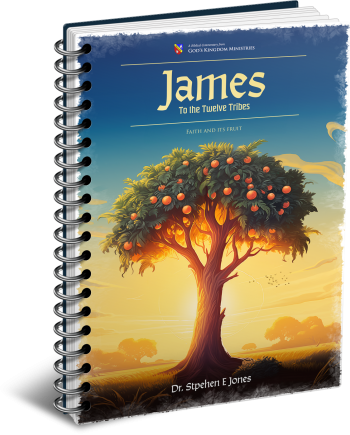Latest Posts
View the latest posts in an easy-to-read list format, with filtering options.

Many in the past have wrestled with the supposed conflict between James and Paul over the issue of law and faith. Both agree that faith needs "fruit" to be considered genuine. Spiral bound book.
Category - Bible Commentaries

James continues his admonition about patience and endurance by writing in 5:9,
9 Do not complain [stenazo, “groan, murmur, sigh”], brethren, against one another, that you yourselves may not be judged; behold, the Judge is standing right at the door.
In the Septuagint translation, the Greek word stenazo was the equivalent of the Hebrew word nehaqa, which was used to describe the “groanings” of the Israelites during their time of bondage in Egypt. The word is used in Exodus 6:5,
5 And furthermore, I have heard the groaning [nehaqa] of the sons of Israel, because the Egyptians are holding them in bondage; and I have remembered My covenant.
Thus, it is likely that James was comparing the Christian oppression in the first century to that of the Israelites under Egyptian bondage. Yet the Christians had been delivered out of bondage at the time when Christ died on the cross as the Passover Lamb. He was the one who was like Moses (Acts 3:22, quoted from Deut. 18:18), called to deliver the people from bondage. Moses delivered Israel from slavery to Pharaoh, but Jesus Christ delivered all men from the bondage of sin.
For this reason, James says, we are not to groan as if we yet remain in slavery. The problem is that even as the Israelites continued to murmur and complain—not against Pharaoh, but against Moses himself—so also does human nature tend to murmur when adversity strikes. When Israel complained against Moses, God took it personally. So also, when we complain against the Body of Christ, Christ takes it personally.
It seems that the habit of complaining under Pharaoh carried over in the wilderness under Moses. This was because the people did not comprehend the sovereignty of God and the divine plan. In their blindness, they assumed that God had abandoned them or was mistreating them. They did not understand that they could not leave Egypt until 400 years after the birth of Isaac (Gen. 15:13), which was also 414 years since the birth of Ishmael. They also had to wait for the iniquity of the Amorites to be full (Gen. 15:16).
For the most part, Christians complain because they do not know all of the facts as God does. Their perspective is largely short-term and personal, whereas God's view is global and long-term. Even today, few people are interested in studying world history through God's eyes, for they have focused primarily on their own personal relationship with God. While such a focus, in itself, is not wrong, it is incomplete, and it often results in murmuring and complaining over the long duration of adverse circumstances.
The immediate cause of such complaint against God and men is our spiritual immaturity. We have not grown in Christ to a sufficient level that gives us patience and endurance. A secondary cause, however, is our lack of understanding of the mind of God, how He thinks, and the divine plan as revealed in His word. We may have great patience, but we still suffer and struggle as long as we do not understand the purpose of adversity in the divine plan. Much of this suffering can be remedied by an understanding of such things as prophecy, timing, and how the judgments of God can originate many centuries earlier.
In the context of Jerusalem, where James lived, he saw the increasing discontent of the Judeans as they chafed under Roman rule. With every revolt, Rome tightened its grip, and in return the people became more rebellious. If they had submitted to the iron kingdom (Dan. 2:40), if they had understood that God had given Jerusalem into the hands of these empires on account of the sins of their forefathers, life would have been much better for them.
But instead, they groaned and complained, and every revolt by every false messiah only made matters worse.
James admonished his readers to avoid divine judgment by not complaining. His statement in 5:9, “behold, the Judge is standing right at the door,” may refer to Matt. 24:32, 33,
32 Now learn the parable from the fig tree [that Jesus had cursed earlier]; when its branch has already become tender and puts forth its leaves, you know that summer is near; 33 even so you too, when you see all these things, recognize that He is near, right at the door.
This warning came in the midst of many end-time warnings of divine judgment upon the world. For this reason, it applies to our time more than any other, for since 1948 we have seen the cursed fig tree come back to life and put forth leaves. While many in the Church expect this “tree” to bring forth the fruit of repentance, Jesus' words will not fail when He said, “No longer shall there ever be any fruit from you” (Matt. 21:19). The tree was cursed for its lack of fruit, not for its lack of leaves.
Jerusalem is again heading into the time of its final destruction for the same reason that it was destroyed by Babylon and again by Rome. Meanwhile, Jewish complaints continue to ascend to the throne of God, even as they refuse to bring forth the fruits of repentance that God requires.
When James wrote his epistle, however, he saw impending destruction at the hands of Rome. His admonition held the key to avoiding such divine judgment. He exhorted them to stop complaining and to accept the judgment which God had decreed.
If the Judeans of the first century had taken heed to this, they might have avoided the war that was soon to bring such mass destruction on the land. On a lesser scale, perhaps, the believers themselves could avoid divine judgment by ceasing from their complaints.
James continues,
10 As an example, brethren, of suffering and patience, take the prophets who spoke in the name of the Lord. 11 Behold, we count those blessed who endured. . .
Later, James brings up Elijah as his primary exhibit of faith, although one might look also at the longer list recorded in Hebrews 11. The men of true faith are juxtaposed to those who complain, even though, as we are aware, Elijah himself complained in the end (1 Kings 19:10), and God then replaced him with Elisha.
The life of a prophet is more difficult than that of an average person. There is greater temptation to complain, because the burden is greater. Nonetheless, the grace of God covered Elijah, and he received a good report among the men of faith in Hebrews 11 as well as in the epistle of James. God knew that a double portion of the anointing was needed to carry the load. Elisha was thus able to complete the work of Elijah, for he carried that double anointing (2 Kings 2:9).
Those men and women of faith established themselves by patience and endurance, and so they were blessed by receiving the promises of God. This was a topic of particular interest to the writer of the book of Hebrews (written, I believe, by Paul). In Hebrews 10 he writes,
32 But remember the former days, when, after being enlightened, you endured a great conflict of sufferings, 33 partly, by being made a public spectacle, through reproaches and tribulations, and partly by becoming sharers with those who were so treated. . . 35 Therefore, do not throw away your confidence, which has a great reward. 36 For you have need of endurance, so that when you have done the will of God, you may receive what was promised.
Such endurance is not a requisite for justification, but it is part of the fruit of faith, as James shows. It is therefore categorized as “works” or the outworking of one's faith, demonstrating its soundness and durability by undergoing the tests of adversity.